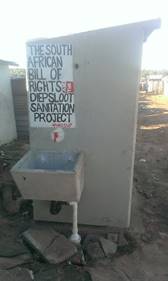
International teams tackle plumbing challenges in Diepsloot during Community Plumbing Challenge 2016. Photo: Stickysituations.org
Having working, clean and safe toilets is a basic human right and access to amenities and services is contained in South Africa’s Constitution. Globally, the Sustainable Development Goals prioritise sanitation and note that “due to bad economics and poor infrastructure, every year millions of people, most of them children, die from diseases associated with inadequate sanitation and hygiene.”
The Social Justice Coalition (SJC) notes that the absence of working, safe and clean toilets “violates the right to human dignity, freedom and security.” This often manifests in the violent protests we see rocking the country, and yet, we can trace the protests’ roots back to people feeling their dignities have been denied.
Most Diepsloot residents have to use communal toilets and complain of the toilets’ inadequate cleanliness and the number of broken toilets. Philemon Mogasha, who has lived in Diepsloot for 13 years, explains the sanitation challenges he and others currently face: “The drains keep blocking and affect our water supply. The toilets are not suitable for people to use and the sewage is always running. It is bad for our health.”
Recent studies show that in Diepsloot Extension 1 anywhere between 13 and 45 households share one toilet, tap and drain. Because of this predicament, residents have to resort to using open fields where they may become vulnerable to criminal attacks. SJC asserts that “no-one should have to fear assault, rape or murder while going to the toilet, yet this is an everyday reality for South Africa’s poor.”
But solving sanitation issues in places like Diepsloot is a challenge. Meaningful partnerships and collaborations have however come into being to improve communal toilet facilities in Diepsloot. Civil society and international organisations have pooled their resources to effect change.
Community Plumbing Challenge
An example is the Community Plumbing Challenge which is currently underway.
It is hosted in Diepsloot by the WASSUP (Water, Amenities, Sanitation Services Upgrading Programme) and the Diepsloot Arts and Culture Network and facilitated in South Africa by Sticky Situations, partnering with the Wot-if? Trust, the International Association of Plumbing and Mechanical Officials (IAPMO), Healthabitat and Autodesk Education.
Eight defunct communal toilets have been plucked out of the ground in Diepsloot Extension 1, where four international student teams (representing Australia, India, United States and South Africa) will now collaborate to develop the most effective and sustainable new upgrade solutions. Teams will assemble and test their new designs, supporting WASSUP to reinstall and reconnect these communal toilets for local Diepsloot residents.
The Community Plumbing Challenge collaboration is an example of the power and potential of participatory decision-making and monitoring in a community.
Says Sean Kearney of IAPMO, “we are working hard to tailor this programme to local contexts and aim to respond to the real needs of the community. While the problems may seem complex, we have no doubt that together we will find innovative ways to solve them.”

